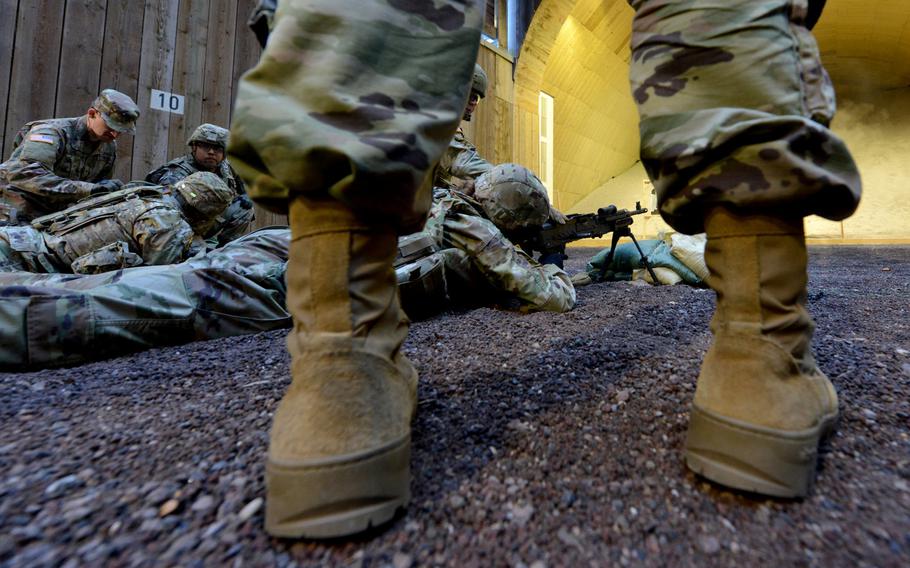
U.S. soldiers assigned to the 554th Military Police Company participate in an exercise at the Panzer Range Complex in Boeblingen, Germany, April 16, 2019. Locals have complained for years about excessive noise from the training facility. (Jason D. Johnston/U.S. Army)
STUTTGART, Germany — A week after Army officials here said the U.S. military had agreed to shoulder the entire $1.2 million added to the bill for a noise reduction project at a Stuttgart area firing range, U.S. European Command is saying not so fast.
EUCOM and the Army garrison in Stuttgart are still determining the total the U.S. government will pay toward a noise mitigation project at a range in Boeblingen, Germany, EUCOM spokesman Lt. Cmdr. Joe Hontz said Thursday.
“It is premature to discuss any details regarding the funding at this time,” Hontz said.
Last week, the garrison announced that a deal had been reached with officials in Boeblingen under which the U.S. would absorb around 80% of the $2.3 million it’s expected to cost to build sound barriers at the Panzer Kaserne range.
For more than a decade, locals in Boeblingen have complained about excessive noise at the site. Studies have been conducted, training hours altered and noise abatement renovations made to try to improve the situation, but local government officials have said the crackle of gunfire is still excessive and the problem remains unresolved.
In 2018, the Army and city of Boeblingen reached a deal to install more sound barriers. The plan called for Boeblingen to pay up to $340,000 for the project and the U.S. military to pick up the remainder of the cost, which at the time was estimated at about $800,000, the Army said.
Since then, however, the estimate has increased to roughly $2.3 million. On June 11, the garrison in Stuttgart said it would pay for all the additional costs. But EUCOM said the U.S. financial share hasn’t been determined.
While the Stuttgart project is small-scale by military standards, it carries with it the potential to reinforce perceptions, frequently expressed by President Donald Trump, that the U.S. is being taken advantage of in its military relations with Germany.
Any deal that involves U.S. taxpayers absorbing the costs to satisfy German irritation over training noises could put a spotlight on defense burden-sharing issues that have strained relations between Washington and Berlin, which has failed to meet NATO benchmarks for defense spending.
While the U.S. Army has been at Panzer Kaserne since just after World War II, the battle over noise is a more recent phenomenon. Between 1950 and 1970, the local government allowed residential development near the range and homes started up. At the time, the noise wasn’t as bad, according to residents.
But things changed with the arrival of special operations units in Stuttgart in the 1990s and more intense training that began in the aftermath of the Sept. 11 terrorist attacks.
EUCOM said negotiations are ongoing.
“Our goal is to work with our German partners to minimize the noise footprint impacting our neighbors in the surrounding area, while providing necessary training for U.S. military personnel,” Hontz said.
vandiver.john@stripes.com Twitter: @john_vandiver